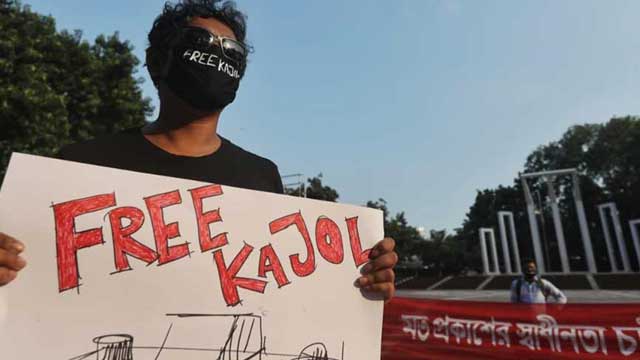It is alarming that some laws enacted by successive governments are not protecting rights of people rather curtailing the freedom of expression, observed a group of speakers at an online seminar on Saturday.
The speakers, mainly civil rights activists, academics and journalists, also said that people were afraid to speak out the truth fearing repression and reprisal.
They also criticised different sections of the Bangladesh Telecommunication Regulatory Act 2001, Digital Security Act, repealed Information and Communication Technology Act 2006 and the Special Powers Act for being obstructive to the freedom of expression and the press.
The Committee for the Protection of Fundamental Rights hosted the webinar titled ‘freedom of expression at the stake.’
British rights organisation Article 19 placed statistics on the infringement of freedom of expression in Bangladesh in 2020 and said that it recorded 1,929 incidents of the violations of the freedom of expression and rights to information, and those incidents had affected 2,613 people.
During the COVID-19 situation, 51 incidents of attack on newspersons were reported while 76 other journalists were subjected to intimidation, attacks, harassment, and incrimination, the paper said.
It said that 64 people had cases filed against them under the Digital Security Act between March and June while 73 people were arrested over cases filed under the act at different times.
Lawyer Shahdeen Malik said that a political party might become a victim of a repressive law, which it enacted during its tenure, after losing the power.
As an example he mentioned the Special Powers Act 1974.
Dhaka University law teacher Quazi Mahfujul Hoque said that the DSA and annulled ICT Act were actually contradictory to the international law and the commitment of Bangladesh towards the international community.
Article 19’s South Asia region director Faruq Faisel criticised the government for hampering the flow of information in society.
He said that the government first forbade journalists to ask questions at the daily COVID-19 press conference from April 7, and then it stopped the official press conference from August 12.
The daily Business Standard’s deputy executive editor Shakhawat Liton said that civil society members had become highly cautious while expressing their opinions verbally or in writings following the enactment and implementation of the acts.
The daily Prothom Alo joint editor Mizanur Rahman Khan said that media owners and officials never lodged their strong protest against the DSA and other repressive acts as they had close relations with the ruling elites.
Rajshahi University mass communication and journalism associate professor Abdullah Al Mamun, human rights activists Sara Hossain and Rezaur Rahman Lenin, among others, spoke at the programme moderated by Shahnaz Huda.





